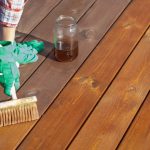Last updated on April 5th, 2022
Our site is reader supported, this means we may earn a small commission from Amazon and other affiliates when you buy through links on our site.
If you are having trouble with weeds, you need a weedkiller. The problem is many commercial weedkillers are full of toxic by-products that you don’t necessarily want going onto any nearby plant, especially if you have a vegetable garden or fruit trees. You also simply might not want to put those chemical by-products into the atmosphere. Thankfully there are plenty of homemade weedkillers that you can apply to your garden and best of all, many are very effective.
First things first, most homemade weedkillers are not as good as commercial products, however, they have been used for hundreds of years and do work so are worth trying.
Think about safety first and what tools you need – i.e. a sprayer
When you are using weed killing products it is still advisable that you wear safety gloves and possibly goggles depending on the product you are using, especially if you using a sprayer. When mixing and spraying, exercise caution and do so outside, being careful not to contaminate any area with spillages, especially your lawns and borders.
Some of the best homemade weedkillers are still not things you want to haphazardly slosh about in your garden.
You will also need a garden sprayer in most cases. While you are boiling and mixing your weed killers, think about how you are going to apply the weed killer.
Are you only getting rid of weeds in the cracks between your pavers? Are you spraying the cracks in your driveway? If that’s the case, most of these homemade weedkillers can be mixed with boiling water and simply poured directly onto the weeds with a watering can.
But if you are targeting smaller sets of weeds inside a bigger garden, or if you are covering a large area and applying the weedkiller preventively every spring, you will need to use a sprayer. You can buy these at any nursery or garden centre and just fill them with your homemade product and spray them according to the directions.
Check out the top recommended garden sprayers in this review roundup we recently did
4 Homemade weedkillers that are easy to make and actually work
What you need to make weedkillers using vinegar, salt and washing up liquid
1. A bottle of 5 litre white vinegar
2. Two handfuls of salt
3. A cup of washing up liquid
Use a sprayer then you can simply pump and spray the weeds. Add the salt and the fairy liquid first. Then add the 5 litres of white vinegar and shake well.
Simply spray the weeds and you should see results within 24 hours.
1. Homemade vinegar weedkiller
This homemade weedkiller uses vinegar and can be very effective. A mixture of one part vinegar to two parts water will kill the weeds in your garden and can be sprayed. You can mix the vinegar with warm water, you do not have to bring it to a boil as you do with salt, and then spray it accordingly or pour it directly onto the weeds that are proving the most problematic.
- White vinegar
- Shelf life: unopened: 24 months
- Store out of direct sunlight
- From Golden Swan
2. Salt mixed with water weedkiller
The second homemade weedkiller is made using just salt. A mixture of 1 cup of salt with two cups of boiling water can be sprayed onto the weeds and around your garden.
This is a mixture that you need to combine with boiling water until all of the salt has dissolved and then spray using your commercial sprayer. In fact, boiling water can kill weeds that are growing in cracks along paths or on your driveway so you have the option to try this method first.
You can also simply pour salt onto weeds, however, this can look a little unsightly and be wasteful.
- Pack of 1
- 6kg Each
3. Baking soda weedkiller
The third homemade weedkiller uses baking soda. Baking soda you don’t need to mix and spray, and instead, you can simply leave handfuls of baking soda across your paved surfaces and then sweep it into all of the cracks. The baking soda will make the cracks in your drive or along your patio inhospitable.
You can use this as a preventative measure by simply filling the areas with baking soda (every year) before the weeds have even had a chance to grow.
No products found.
4. Bleach – use with caution
The fourth uses bleach. Now, this is significantly better than the chemicals you will find in harsh herbicides and weedkiller products, however, it’s still something you should use in a well-ventilated outdoor space, whilst wearing safety gloves and goggles.
For this homemade weedkiller, you want to dilute bleach, with a ratio of 1 cup of bleach for 3 cups of water. Once it’s mixed, spray it directly onto the plants you want to kill, taking extreme caution and being careful not to use this on the plants you want to survive and even more so avoiding any plants that will bear fruit or vegetables that you will be eating in the future.
Bleach is not a natural product so we would strongly recommend trying this as a last resort.
With these four methods, you can prevent weeds from ruining your well-landscaped garden without damaging the environment. Be cautious when using bleach, for the reasons mentioned above, and try other homemade weedkillers first because they aren’t natural products.
Last update on 2025-07-09 / Affiliate links / Images from Amazon Product Advertising API




